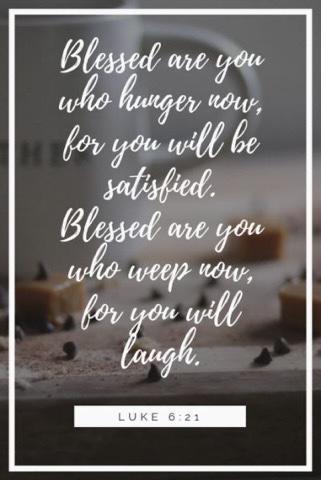Now we have to shape what some have started calling; The Church at Home. Although I keep asking myself; What do those who do not have a home do? For this reason, at the same time, I am declaring today in our Holyrood Church a Lenten day of prayer, fasting and reading the Bible in the Time of the Coronavirus.
Blessed are the poor people!

Good morning, happy Wednesday, and many blessings.
The Gospel today (Luke 6:20-26) presents four blessings and four curses. There is a progressive revelation in the way in which Luke presents the teaching of Jesus. Up to 6:16, he says many times, that Jesus taught the people, but he did not describe the content of the teaching (Luke 4:15,31-32,44; 5:1,3,15,17; 6:6). Now, after having said that Jesus sees the crowd desirous to hear the Word of God, Luke presents the first great discourse which begins with the exclamation, “Blessed are you who are poor!” and “Alas for you, rich!” and then takes up all the rest of the chapter (Luke 6:12-49).
Some call this discourse the “discourse on the plain” because, according to Luke, Jesus came down from the mountain and stopped in a place which was flat and there He pronounced His discourse. In Matthew’s Gospel, this same discourse is given on the mountain (Matthew 5:1) and is called “The Sermon on the Mount.” In Matthew, in this discourse there are eight Beatitudes, which trace a program of life for the Christian communities of Jewish origin. In Luke, the sermon is shorter and more radical. It contains only four Beatitudes and four curses, directed to the Hellenistic communities, formed by rich and poor.
This Sermon on the Plain has been called The Christian Manifesto as it sets out the values and ideals of the Christian Life in the Kingdom. It is a pledge to be detached from all that is not of God and that one’s life be guided by what is conducive to the service of God or, to put it another way, by what is conducive to the end for which we were created. They are difficult passages to understand and equally difficult to have as the guiding principles of our lives.
Four contrasts are referred to in these few scripture verses – poverty/riches; hunger/fullness; sorrow/laughter; and defamation/commendation. Jesus upturns the values we would normally consider desirable. He asks us to realize that we are not living simply to be happy in this life but we should ask ourselves the deeper value of our ways of life in the light of what we can bring with us to eternal life.
I try to see which beatitude touches me today, whether because it helps me rejoice in God's gifts to me or because I feel a resistance in my heart. I pray for a listening heart. I ask myself to what extent I understand and live the Christian life in the perspective of the beatitudes, as the seeking of blessedness and happiness, and beyond a mere living according to the rules.
There are no glossy images here! Who wants to be poorer, sad, in conflict, excluded or demeaned? Jesus does not ask us to seek out discomfort but wants us to realize that God always holds a brighter promise for us. We seek and find God where we are but always realize that God calls us further – we have not arrived. And part of the call is that we look for ways to destroy the socio-socioeconomic and religious structures that impoverish the people.
Today I invite you to reflect on these two questions: Do we look at life and at people from the viewpoint of Jesus? What do you think in your heart: is a poor and hungry person truly happy?
Blessings
Fr. Luis+
- Log in to post comments
